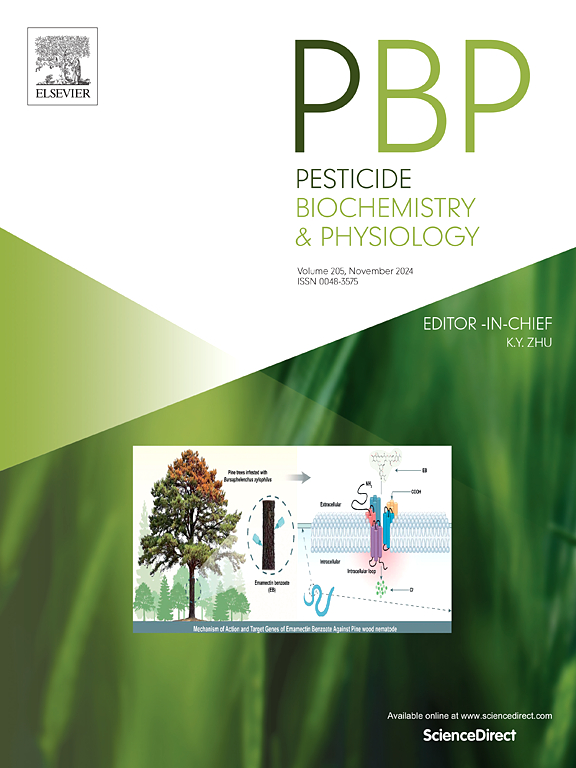化学农药对鱼类的毒理学效应:重点关注肠道损伤和肠道微生物失调
IF 4.2
1区 农林科学
Q2 BIOCHEMISTRY & MOLECULAR BIOLOGY
引用次数: 0
摘要
肠道易受环境污染物的影响,是动物和人类交换内部和外部物质的重要屏障。肠道菌群在营养代谢、功能性化合物合成、免疫调节、炎症和感染等方面发挥着重要作用。肠道菌群失调可引起肠道物理屏障损伤,引发炎症,增加肠道通透性。肠道屏障功能障碍促进致病菌和有害化学物质通过血液循环系统进入人体,可能引起神经毒性、肝毒性、呼吸毒性、生长抑制,甚至死亡。本文综述了近十年(2015-2025)化学农药对鱼类肠道和肠道微生物群毒性作用的研究进展,并试图总结其潜在的毒理学机制。化学农药暴露会引起肠道损伤,损害免疫功能,破坏鱼类肠道微生物群。肠道微生物生态失调与肠道损伤密切相关。肠道微生物代谢物的改变,如脂多糖、肽聚糖和短链脂肪酸,与肠道损伤、炎症和通透性改变有关。化学农药对鱼类肠道损伤的机制包括细胞凋亡、氧化应激和炎症,这些机制由活性氧途径以及死亡受体和线粒体信号通路介导。此外,农药引起的肠道生态失调可通过微生物群-肠-脑/肝轴引起神经毒性和肝毒性。本文章由计算机程序翻译,如有差异,请以英文原文为准。

Toxicological effects of chemical pesticides in fish: Focusing on intestinal injury and gut microbial dysbiosis
The gut is susceptible to environmental pollutants and is a crucial barrier to exchanging internal and exterior substances in animals and humans. Intestinal microbiota plays vital roles in nutrition metabolism, synthesis of functional compounds, immune regulation, inflammation, and infection. Gut microbiota dysbiosis can induce intestinal physical barrier damage, trigger inflammation, and increase gut permeability. Intestinal barrier dysfunction facilitates the entry of pathogenic bacteria and harmful chemicals into the body through the blood circulation system, potentially causing neurotoxicity, hepatotoxicity, respiratory toxicity, growth inhibition, and even death. Herein, we overviewed the knowledge on the toxic effects of chemical pesticides on fish intestines and gut microbiota in the latest decade (2015–2025) and attempted to summarize the potential toxicological mechanisms. Chemical pesticide exposure can cause intestinal damage, impair immune function, and disrupt gut microbiota in fish. Gut microbial dysbiosis was strongly associated with intestinal injury. Alterations in gut microbiome metabolites, such as lipopolysaccharide, peptidoglycan, and short-chain fatty acids, have been linked to intestinal damage, inflammation, and changes in permeability. The mechanisms underlying intestinal injury in fish exposed to chemical pesticides included apoptosis, oxidative stress, and inflammation, which are mediated by reactive oxygen species pathways as well as death receptor and mitochondrial signaling pathways. Furthermore, pesticide-induced intestinal dysbiosis can cause neurotoxicity and hepatotoxicity through the microbiome-gut-brain/liver axis.
求助全文
通过发布文献求助,成功后即可免费获取论文全文。
去求助
来源期刊
CiteScore
7.00
自引率
8.50%
发文量
238
审稿时长
4.2 months
期刊介绍:
Pesticide Biochemistry and Physiology publishes original scientific articles pertaining to the mode of action of plant protection agents such as insecticides, fungicides, herbicides, and similar compounds, including nonlethal pest control agents, biosynthesis of pheromones, hormones, and plant resistance agents. Manuscripts may include a biochemical, physiological, or molecular study for an understanding of comparative toxicology or selective toxicity of both target and nontarget organisms. Particular interest will be given to studies on the molecular biology of pest control, toxicology, and pesticide resistance.
Research Areas Emphasized Include the Biochemistry and Physiology of:
• Comparative toxicity
• Mode of action
• Pathophysiology
• Plant growth regulators
• Resistance
• Other effects of pesticides on both parasites and hosts.

 求助内容:
求助内容: 应助结果提醒方式:
应助结果提醒方式:


